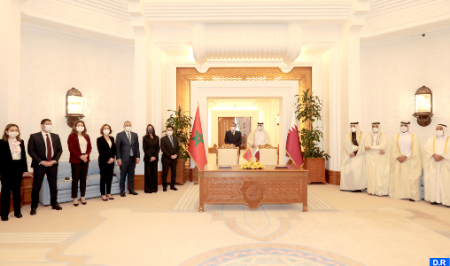Morocco-Qatar High Joint Commission: Doha Hails HM the King’s Efforts to Defend Al-Quds Al-Sharif
Qatar hailed the continuous efforts made by His Majesty King Mohammed VI, Chairman of the Al-Quds Committee, to defend Al-Quds Al-Sharif and its inhabitants. On the occasion of the eight session of the Moroccan-Qatari high joint commission of cooperation, held Monday in Doha, chaired by chaired by the Qatari Prime Minister and Minister of Interior Sheikh Khalid bin Khalifa bin Abdulaziz Al-Thani, and the head of government, Aziz Akhannouch, Qatar also praised the efforts of His Majesty the King to safeguard the Holy City of Al-Quds Al-Sharif and its civilizational identity and preserve its position as a symbol of tolerance and coexistence between the different monotheistic religions, as well as the humanitarian and social projects implemented by the Bayt Mal Al-Quds Al-Sharif Agency to settle the Maqdessis on their land and support their resistance. The minutes of the Commission’s reiterated the solidarity with the Palestinian people and their right to establish their independent and sovereign state with East Al-Quds as its capital, in accordance with the relevant resolutions of international legitimacy. It also called on the various parties and supporters of peace to break the stalemate in the peace process and to work for the launch of serious peace negotiations within a specified timeframe to end the Israeli occupation and reach an agreement that addresses all the issues of the final solution, based on the Arab Peace Initiative, the resolutions of international legitimacy and related initiatives and in accordance with the two-State solution. The Commission stressed that the continuation of this issue without a solution will only exacerbate tensions and extremism in the region and would be a source of threat to security and stability, reiterating its commitment to the legal status of Al-Quds Al-Sharif, in accordance with international resolutions, as one of the final status issues, and to the abandonment of anything that would undermine the existing political status of this Holy City. Regarding the security and economic conflicts and problems facing the Arab region and the rise of foreign interference, the Commission called for enabling the Arab countries to defend their unity and sovereignty and strengthen their security and stability, through defending the values of solidarity and good neighborliness, and refraining from any interference in the internal affairs of countries and threatening their territorial integrity. In this regard, the Commission expressed its hope that the crises suffered by brotherly Arab countries, such as Iraq, Syria, Yemen and Libya, will find a political solution that preserves their territorial and national integrity, guarantees their security and stability, and meets the aspirations of their peoples for development and freedom, in accordance with the relevant UN resolutions. The Commission also condemned the continued targeting of civilian and economic facilities in the Kingdom of Saudi Arabia and the United Arab Emirates, reaffirming its constant and continued solidarity with the two brotherly countries. The Commission reiterated its condemnation of extremism and terrorism in all its forms, regardless of their justifications and motives, stressing that this dangerous scourge should not be linked to any civilization or religion. In addition, the commission stressed the need to combine and coordinate regional and international efforts to confront terrorism, eradicate it and eliminate its causes.

